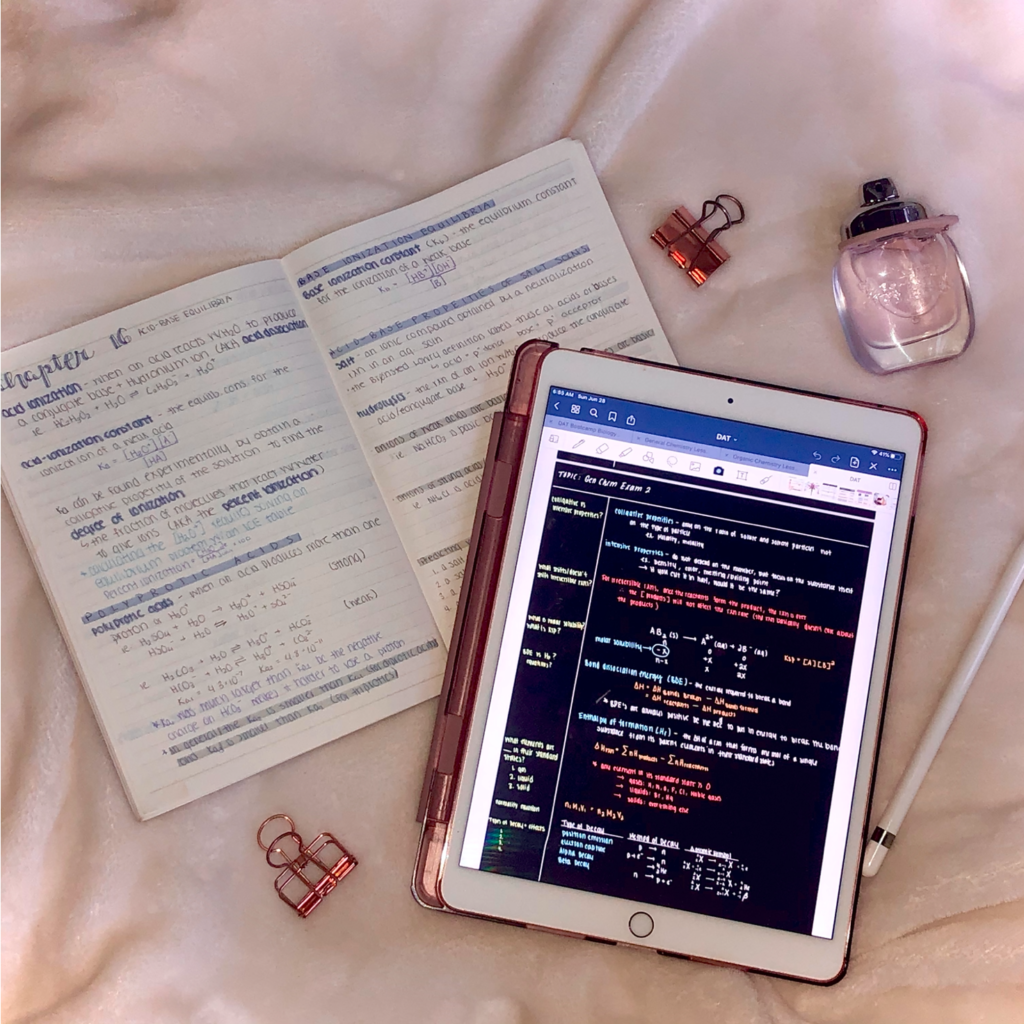Science courses can be a major struggle, especially while making the transition from high school to college. When I started college, I felt like my grades were never what I wanted them to be — regardless of how much work I put in. But, after much trial and error, I’ve finally figured out the real way to succeed in science courses! Keep reading to see my study tips and tricks.

What Not To Do
During my time as a Resident Assistant (RA), I had at least one-third of my residents came to me with the same problem: “I studied for hours, but I did terribly on my first exam. I’m really scared for the second one.” When I asked how they studied, I would always hear, “I rewrote my notes, made flashcards, and read the textbook.” I did the same thing my freshman year — and it didn’t work.
If you take one thing away from this entire post, please know that passive studying is the least effective way to study for STEM courses. Do. Not. Do. It. Passive studying is basically a way to review material until you’ve internalized it. Some examples of passive learning are:
- Reading the textbook
- Rereading class PowerPoint slides
- Rewriting notes
- Definition only flashcards
The problem with passive studying is that you only memorize the material. This technique will not help you develop the critical thinking and problem-solving skills that you need to do well in science.
What To Do Instead
Instead of passive studying, utilize active studying at least 80% of the time. Active studying is engaging and working with the material. For science classes, this is mostly practice problems. This can look different based on the class setup, so I’ve broken down the two methods I use to excel in my science courses. Dean’s list, here we come.
Homework Heavy Courses
Homework heavy courses are the easiest to actively study with. You’ll have tons of materials to work with, so take advantage of that. The problems that your professor assigns reflect the skills they think are important (AKA the ones that show up on tests). So, if you can do the homework, then you can do the exam.
For these classes, it is really tempting to memorize notes first and do the practice problems later. But this is a waste of time. Here are the steps you should take instead:
- Pull out the homework, your notes, and a highlighter.
- Read the first homework problem.
- Highlight in your notes all the information that was required to solve the problem. (ex. equations, key terms, key concepts, etc.)
- Solve the problem.
- Repeat steps 2-4 for all the homework problems.
It probably seems strange to do homework if you haven’t “studied’ it first. However, you’ll find that many problems draw from the same topics, so you’ll naturally start to memorize the equations, terms, and concepts. And most importantly, you’ll learn how to solve problems.
Another perk of this method is that you’ll end up with a study guide. You’ve just highlighted all the key information that the professor wants you to know, so when the exam rolls around, you’ll know exactly what was important from the unit.
Exam Heavy Courses
Ok, so if active studying is mostly practice problems, what happens if you don’t get homework?
I’ve been in plenty of classes where the only grades are quizzes and exams, with no homework at all. In a course like this, I make my own practice problems. If you’re as obsessed with Ali Abdal’s YouTube channel as I am, you’ve probably heard him talk about this technique before. Making your own questions can seem really hard, but I promise it’s way easier than it sounds. Here is my process.
- Print out lecture slides and take notes on them during class.
- After class, put your notes next to your computer.
- Start on slide one. Write as many questions as you need to have covered all the information on the slide. Generally, lecture slides have a main theme and a few pictures, so sometimes one question covers it all. Also, don’t bother writing answers to the questions, you can just look in your notes if you get stuck.
- I mostly use the following types of questions:
- Definition questions: “What does X mean?” or “What is the function of Y?”
- Mechanism questions: “How does X work?” or “How is Y made?”
- Compare/Contrast questions (for similar concepts): “How are X and Y different? How are they similar?”
- Consequence questions: “What happens if X doesn’t work?”
- Activities/Commands: “Draw out X” or “Label this diagram”
- I mostly use the following types of questions:
- Repeat step 3 for all the slides.
- Make time every day to review your questions. Create a color code for questions that you’ve gotten wrong one time, two times, three times, etc. This will make it very obvious what areas you need to work with more.
This basically gives you homework assignments/quizzes for every lecture. The cool thing is, if you can answer all the questions, there’s not a chance that you’ll be surprised by anything on the exam. In fact, many of the exam questions will be what you’d already written for yourself!
A Bonus Strategy
Generally, I do one of the two aforementioned methods for all my science classes. However, there is one more skill you need to learn — listening to your professor.
Usually, on the first day of class, your professor will go over the syllabus and tell you exactly how they expect you to study. If they say read the book, read it. If they say to study for 8 hours a week, add that to your schedule. Why? Because they. write. the. exam.
Contrary to the way it feels sometimes, professors don’t actually want you to fail. They give you hints on what they expect you to be doing to succeed.
BUT, every now and again, a professor gives advice that doesn’t match up.
Let’s say your professor tells you to read 3 chapters a day, do 30 book problems, and do 50 homework problems every class. That’s a lot of work, but ok. But then, they tell you that you should only be spending about 5 hours a week on the class? Lies.
If that happens, I simply go to the professor after class and POLITELY (do NOT come to your professor with an attitude/ego) tell them the expectations I’m hearing and how it’s going in real life. Chances are, they’ll see the contradiction in their expectations and give you the real scoop on what they want.
And that’s it! Now get out there and slay those science classes, you genius!

